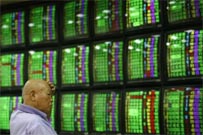Asian markets in freefall on doubt over bail-out's success
 Tokyo - Markets across Asia plummeted on opening Thursday, dragged down by US retail sales data and concerns about whether bank bail-outs would be able to rescue financial markets and avert a recession.
Tokyo - Markets across Asia plummeted on opening Thursday, dragged down by US retail sales data and concerns about whether bank bail-outs would be able to rescue financial markets and avert a recession.
The Tokyo stock market plummeted in early trading after Wall Street's blue-chip Dow Jones industrials lost nearly 8 per cent overnight amid growing recession fears in the United States and worldwide.
The benchmark Nikkei 225 Stock Average plunged 911.91 points, or 9.55 per cent, to 8,635.56.
The broader Topix index of all first-section issues dropped 7.57 per cent to 883.21.
After stocks fell, Japan's central bank injected 600 billion yen (5.92 billion dollars) into money markets to ease the credit crunch that has resulted from the global financial crisis.
Hong Kong's Hang Seng Index opened more than 6 per cent lower. The blue-chip index, which lost 5 per cent of its value Wednesday, was down a further 6.11 per cent at 15,020.75 within 20 minutes of the start of trading.
Taiwan's Taiex index traded 3.14 per cent lower in the morning at 5,081.69, dampened by Wall Street woes and the death of Wang Yung-ching, founder of Taiwan's petrochemical giant Formosa Group, dealers said.
Stocks of all six listed companies of the Formosa Group fell sharply on the death of the group founder, dubbed the "god of management" and the second-wealthiest man in Taiwan.
Investors fled Australian stocks in response to Wall Street registering its biggest one-day percentage loss in 20 years.
In early trading in Sydney, the ASX 200 fell 3.6 per cent to 4,067.
New Zealand's NZX 50 was trading at 2,771.61, down 4.58 per cent.
In China, the key Shanghai Composite index was down 3.79 per cent to 1,919.14. The smaller Shenzhen Component index was also down 3.05 per cent to 508.71.
Singapore's Straits Times Index plunged 6.3 per cent to 1,927.74.
In Seoul, South Korea's Kospi index plummeted 6.62 per cent to 2,627.68 after the ratings agency Standard and Poor's said Wednesday that it might cut credit ratings for a number of South Korean banks.
The local currency, the won, slumped 12 per cent, the worst loss since the country had to be bailed out by the International Monetary Fund in December 1997 during the Asian financial crisis. (dpa)